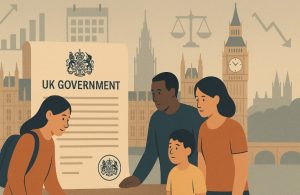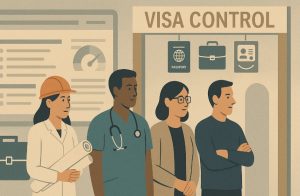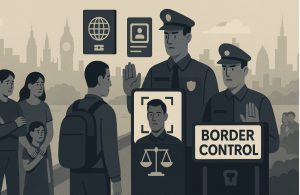Table of Contents
ToggleIn May 2025, the UK government unveiled one of the most comprehensive overhauls of its immigration system in recent history.
The release of the white paper titled “Restoring Control over the Immigration System” marked a pivotal moment in British migration policy, reflecting the government’s goal of reducing net migration, controlling borders, and aligning immigration with national interests.
This new framework, announced by Prime Minister Keir Starmer and Home Secretary Yvette Cooper, aims to reassert control over who can enter and stay in the UK, with a strong focus on rewarding economic contribution and integration.
With net migration exceeding 900,000 in 2023 and only recently falling to 728,000 in 2024, the reforms are designed to significantly lower these figures by the end of the current Parliament.
So, what has changed, and how do these changes affect migrants, employers, families, and students?
What Are the Latest Changes to the UK Immigration Policy in 2024–2025?

The immigration reforms are designed to restore public trust in the system, enhance fairness, and place more responsibility on employers and migrants alike.
Rather than offering open-ended entry and settlement options, the new policy introduces more stringent criteria at every level from work and family visas to study and citizenship.
Core Objectives:
- Reduce net migration significantly by the end of Parliament
- Align immigration policy with labour market needs
- Encourage integration through English language requirements
- Prioritise migrants who offer measurable economic or societal contributions
This reset marks the end of what Starmer described as a “one-nation experiment in open borders” and moves towards a “common-sense” model that supports British workers and communities.
How Has the Points-Based Immigration System Been Updated?
The UK’s points-based immigration system, first introduced after Brexit, has been restructured to tighten access and raise the quality threshold for applicants.
The government has now limited visa access under this system to applicants with qualifications equivalent to RQF Level 6 (degree level) and above, replacing the previous minimum of RQF Level 3 (A-level equivalent).
Although RQF Levels 3 to 5 will still allow skilled worker visas, this is restricted to time-limited roles in sectors where domestic shortages are officially recognised. Employers in these sectors must also demonstrate active investment in British recruitment and training.
This approach directly addresses the long-standing concern that employers relied too heavily on low-cost overseas labour at the expense of local skills development.
What’s New in the Skilled Worker Visa Regulations?

A cornerstone of the reform is the transformation of the Skilled Worker visa route. The new regulations raise the minimum salary requirement from £26,200 to £38,700, effectively narrowing the field of eligible applicants and positions.
Additional updates include:
- Employers must show a long-term workforce strategy aligned with domestic recruitment targets.
- The Immigration Salary List previously known as the Shortage Occupation List, has been discontinued, removing the salary discount for certain roles.
- Social care visas are being phased out for new overseas applicants, with a transition period in place until 2028 for existing workers.
These measures are expected to curb what the government described as “backdoor routes” into the UK labour market and drive employers to invest in training local talent.
How Have UK Spouse and Family Visas Changed in 2024?
The family migration category has undergone significant revision. The income threshold for sponsoring a partner has been raised from £18,600 to £29,000, and is set to increase again to £38,700 in 2025. This aligns family migration with the economic contribution model adopted across other visa routes.
A critical change involves the treatment of dependants:
- All adult dependants accompanying visa holders must now meet basic English language requirements.
- Continued stay will be contingent on demonstrating progression in English proficiency over time.
The Home Office has also pledged to legislate against the overuse of Article 8 of the European Convention on Human Rights, which previously allowed migrants to challenge deportation based on their right to a family life. This change aims to ensure that legal protections are not used to override public interest or immigration controls.
What Does the Immigration Crackdown Mean for Legal Migrants?

The government’s plan introduces a tougher stance on both entry and enforcement. One of the most significant changes is the extension of the settlement qualifying period from five to ten years.
This applies across most routes, including work and family visas, and aligns settlement eligibility with continued contribution to the UK economy and society.
Moreover, the policy introduces a contributions-based model for both settlement and eventual citizenship. Migrants must not only remain compliant with visa conditions but also demonstrate a meaningful economic and social impact.
The crackdown also includes:
- Stricter visa conditions across all categories
- Increased deportation provisions, including for those with minor criminal offences
- Expansion of penalties and sanctions for sponsors who fail to comply with the rules
These reforms aim to make UK residency a reward for contribution, rather than an automatic entitlement.
What Are the Recent Changes to British Citizenship Laws?
The UK now has one of the most stringent citizenship processes in the developed world. The key reform is the increase in the residency requirement for settlement (Indefinite Leave to Remain) from five to ten years.
Comparison of Settlement Requirements:
| Country | Minimum Residency for Citizenship |
| United Kingdom | 10 years |
| United States | 5 years |
| Australia | 4 years |
| New Zealand | 5 years |
| Canada | 3 years (within a 5-year window) |
This makes the UK an outlier globally, prompting concerns from policy analysts who argue that longer periods of legal limbo may discourage integration and increase the risk of individuals falling into insecure legal statuses.
However, the government maintains that this new approach will ensure that only high-contributing, well-integrated individuals earn the right to remain permanently.
How Is the Migration Advisory Committee Influencing Immigration Reform?

The Migration Advisory Committee (MAC), together with the newly formed Labour Market Evidence Group, is central to the new system. Their role is to advise the government on:
- Labour market shortages
- Salary benchmarking
- Sector-specific visa needs
No visa route will be opened or extended without clear evidence from MAC or related bodies, ensuring that migration responds directly to UK economic needs and not employer convenience.
What Do These Immigration Changes Mean for UK Employers and Startups?
For employers, particularly startups and SMEs, the new rules demand greater accountability and forward planning. Companies must now prove their commitment to domestic hiring before accessing overseas recruitment channels.
There are several implications:
- Sponsorship will become more expensive due to higher salary requirements and increased compliance obligations.
- Startups may need to partner with educational institutions and invest in training to meet domestic workforce demands.
- Visa sponsorship compliance will be monitored more strictly, and non-compliant firms risk losing their licence or facing penalties.
This strategy is designed to prevent what ministers call “labour market distortion” caused by cheap overseas labour and to promote sustainable economic growth.
How Do the New Immigration Laws Compare to 2023 Policies?
The following table offers a direct comparison between the previous and current immigration rules:
| Policy Area | 2023 Rules | 2024–2025 Rules |
| Skilled Worker Salary | £26,200 | £38,700 |
| Settlement Period | 5 years | 10 years |
| Family Visa Income Threshold | £18,600 | £29,000 (rising to £38,700) |
| Citizenship Criteria | Time-based | Contribution-based and time-based |
| English Language Level | B1 (CEFR) | B2 for main applicants and dependants |
| Graduate Visa Duration | 2 years post-study | 18 months post-study |
| Social Care Visa | Open to overseas recruitment | Close to new overseas applicants |
| Sponsorship Requirements | Basic compliance | Workforce strategy, compliance, and penalties |
What Could Be the Future of Immigration Law in the UK?

The current reform package is only the beginning of a broader restructuring that will continue over the course of this Parliament. Future measures will include:
- Further digitisation of immigration processes, including universal adoption of e-identity cards
- Publication of new asylum and border security reforms
- Introduction of fast-track routes for highly skilled individuals in healthcare, AI, and scientific research
- Expansion of the Global Talent and Innovator Founder visas
- Strict compliance regimes for educational institutions sponsoring international students
The government’s approach aims to keep the UK open to top global talent while eliminating exploitative or unsustainable migration practices.
Conclusion: How Should Individuals and Businesses Navigate the New Immigration Landscape?
The UK’s immigration reforms reflect a clear shift toward a system built on accountability, economic alignment, and national interest. Whether you are a prospective migrant, a student, or an employer, these changes demand greater preparedness and understanding.
Individuals should focus on:
- Improving English language skills
- Securing roles in sectors aligned with the UK’s economic goals
- Planning for a longer residency path before achieving settlement
Businesses must:
- Develop internal workforce strategies
- Ensure full compliance with sponsorship obligations
- Engage with domestic training programmes and educational partnerships
The message is unambiguous: the UK remains open to contribution, not convenience. Those who align their aspirations with this new model will find opportunities to thrive in a rebalanced system that puts fairness and public confidence at its core.
Frequently Asked Questions
How long must I now live in the UK before applying for settlement?
The standard period has been extended to 10 years, replacing the previous five-year rule. Only those who make exceptional contributions may qualify earlier under specific routes.
Can I still apply for a family visa if I earn below £29,000?
Not unless exceptional circumstances apply. The income threshold is now £29,000, rising to £38,700 in 2025.
Are English language requirements higher now?
Yes, the required level is now B2 on the CEFR scale. This applies to both main applicants and adult dependants, and progression over time is mandatory for extensions or settlement.
What is the new rule for graduate visa holders?
International students can now remain for only 18 months post-graduation, compared to the previous two years.
How does this impact the care sector?
New overseas recruitment for social care visas is being phased out. Only those already in the UK can extend or switch roles until 2028.
What kind of migrants are prioritised under the new system?
High-contributing individuals in sectors like healthcare, AI, engineering, and scientific research are prioritised for fast-track pathways.
Will there be more changes to immigration law soon?
Yes, additional changes to asylum, enforcement, and border control are expected later in 2025, as part of the ongoing implementation of the government’s Plan for Change.




